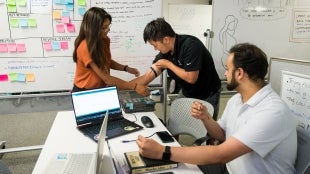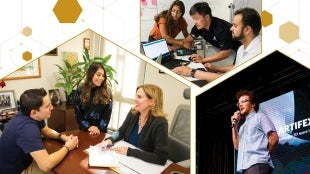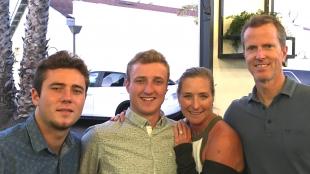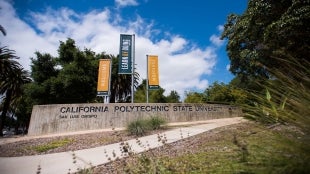Married Alums/Entrepreneurs Give to the Center for Innovation & Entrepreneurship
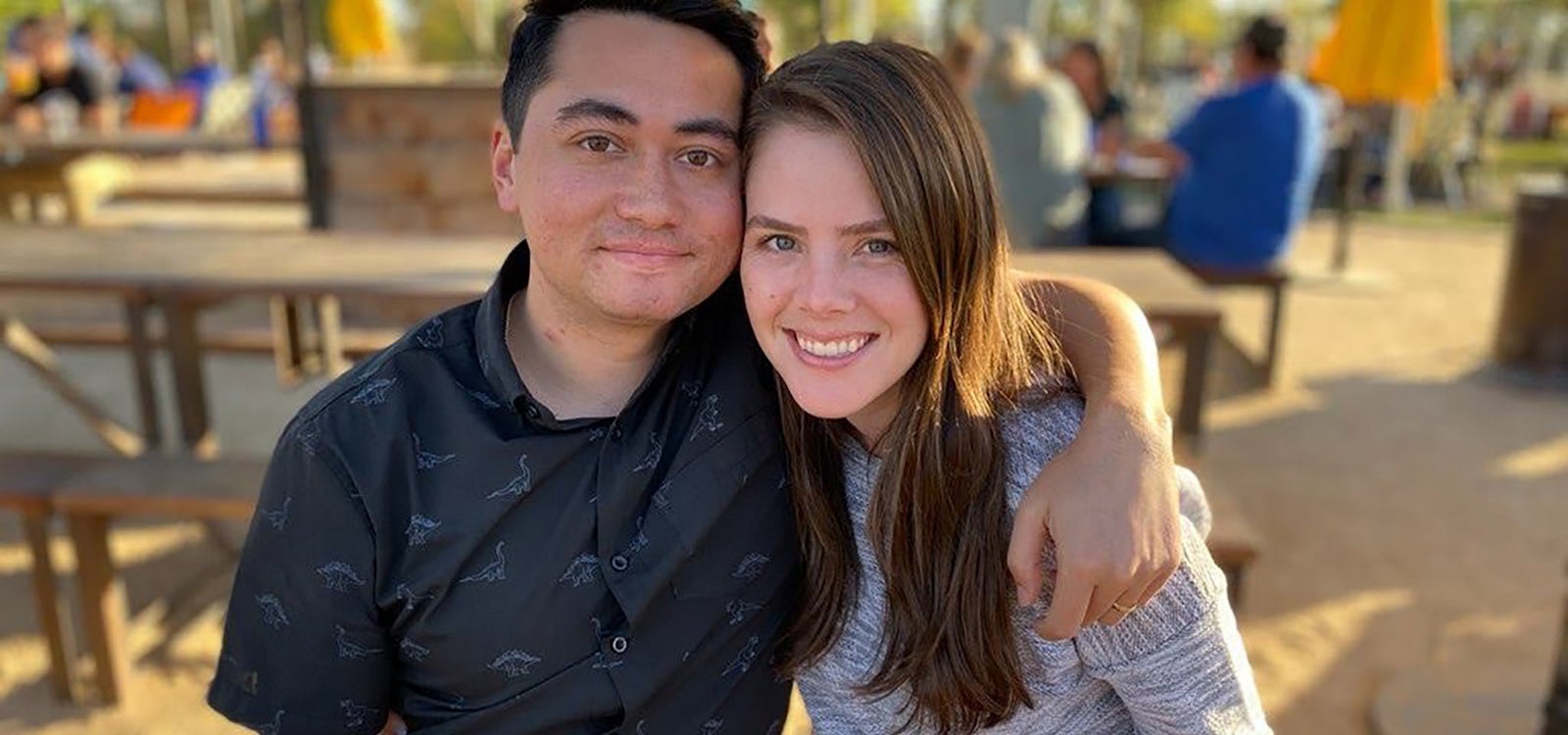
After business student Jessie Becker posted a flyer promoting a 2011 startup competition, a computer engineering major with a notebook full of business ideas in his back pocket stopped and took notice:
Submit your idea. Win $15,000. Free pizza.
“Something clicked for me,” Ian Alexander remembered. “I thought, ‘This is the time — and I’ll get free pizza.’”
Over a decade later, Ian and Jessie (now Jessie Becker Alexander) are a married couple who each started two of the more successful businesses to have emerged from Cal Poly. And a significant monetary donation to Cal Poly’s Center for Innovation & Entrepreneurship (CIE) is just one way the two have attempted to both pay it forward and recognize those who helped them.
“I have always loved the entrepreneurial community in general,” Jessie said. “My experience as a young founder was shaped by mentors and by people who gave back to the university and the community, and now I have some experience and some knowledge that I think would be helpful to other students and other founders.”
Their journeys provide inspiration to students and illustrate how Cal Poly nurtured and furthered their success.
“From the programs and the mentors and the founder community that was created, all of those things were absolutely critical,” Jessie said.
Growing up south of Sacramento to a family of business owners, Jessie’s first business venture entailed piglets.
“I raised pigs growing up,” she said. “And through that venture, I was able to buy my first car.”
While Jessie sold animals to fellow 4-H kids, Ian found customers among his young Berkeley, CA, classmates.
“My very first business was an import/export business in middle school, where I bought a bunch of jewelry in Thailand and sold it in class for, like, two dollars apiece, which was awesome,” he said.
At Cal Poly, where she enrolled in 2007, Jessie was inspired by Jon York’s Introduction to Entrepreneurship course.
“That class really sparked my imagination and my critical thinking skills,” she said.
York, who recently retired, was a CIE co-founder, and Jessie, a business administration student with a concentration in entrepreneurship, became one of CIE’s first employees.
The CIE was created in 2010 to support startups with mentorship, physical spaces, money and more. The center , which also supports curricular and scholarly work, features programs such as the Hatchery, Incubator, Summer Accelerator and competitions. While working as a CIE coordinator, Jessie posted a flyer advertising Innovation Quest, an annual competition that has awarded over $400,000 in support of Cal Poly innovators and entrepreneurs.
At the time, Ian had two tech businesses in mind. But at that point, they were merely a series of ideas he’d written in his notebook. Once he and three other students won the first place Innovation Quest award — and its $15,000 prize — he was hooked.
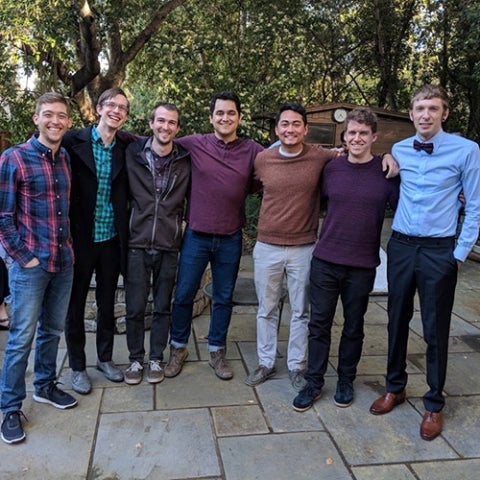
Their company, RepairTech, was selected as an incubator at the CIE’s Summer Accelerator program, which provided a slew of resources and mentors, some who became investors.
“The whole entrepreneurial experience was super addictive,” Ian said. “I was learning so much every day.”
At the same time, biomedical engineering students Davis Carlin and Alex Norred entered Innovation Quest with their senior project —a device designed to stop postpartum hemorrhaging, a major medical event that kills tens of thousands of women annually and affects up to one in 10 mothers. As the pair’s concept progressed to the CIE’s HotHouse, Jessie became more involved with the startup, then known as InPress Technologies.
“I fell in love with the problem and wanting to make some positive change in women’s health,” Jessie said.
“The whole entrepreneurial experience was super addictive,” said Ian.
As she continued to work as a HotHouse coordinator, Jessie would help motivate other entrepreneurs, including the RepairTech team.
“They worked harder and longer than anyone else,” Jessie recalled. “I spent more time at the HotHouse than I did at home, and they were always there.”
An environment that assembles, encourages and supports entrepreneurs is conducive to innovation, said Stern Neill, a Cal Poly marketing professor who recently published a paper titled “Light Bulb Moments: Where Do Student entrepreneurs Get Their Ideas” with business librarian Mark Bieraugel.
“The CIE and the whole ecosystem it represents is powerful stuff,” said Neill, who has taught at Cal Poly for nearly 15 years said. “Having events for students, having these competitions, having the entrepreneurships in residence, having faculty fellowship programs, the industry connections, the spaces where you’re engaging with others and ideas, creating these platforms — what a great thing to put students in.”
Having dedicated spaces for interdisciplinary teams, such as the Hatchery on campus or the HotHouse downtown, sparks great ideas, Neill said.
“That’s a place where they can think through messy problems,” he said. “It’s enabling for ideation.”
One noteworthy feature of CIE programs is a cadre of over 100 engaged alumni, said Cory Karpin, interim CIE co-executive director as well as senior director of development for the CIE and HotHouse.
“Over the last 10 years, we’ve built a network of alumni that are willing to give as advisors, mentors and coaches to students,” Karpin said.
Young entrepreneurs are often fearless, which can be a benefit if they have help from experienced innovators who can help them avoid mistakes, said Tom Katona, associate professor of innovation and entrepreneurship.
“The last thing you want to do is take six months to do something that can be done in a week just because you don’t know any better,” he said. “That can kill a business.”
Mentors form trusting relationships with young entrepreneurs over time, Katona said.
“They are truly ongoing advisors,” he said.
The CIE has also assembled a variety of investors, providing financial resources when startups are ready to take the next step.
In a relatively short time, CIE’s measurable results became clear: More than 120 companies have been launched, $250 million in capital has been raised and over 1,000 jobs have been created.
And one married couple epitomizes that success with two startups.
“My experience as a young founder was shaped by mentors and by people who gave back to the university and the community, and now I have some experience and some knowledge that I think would be helpful to other students and other founders," said Jessie.
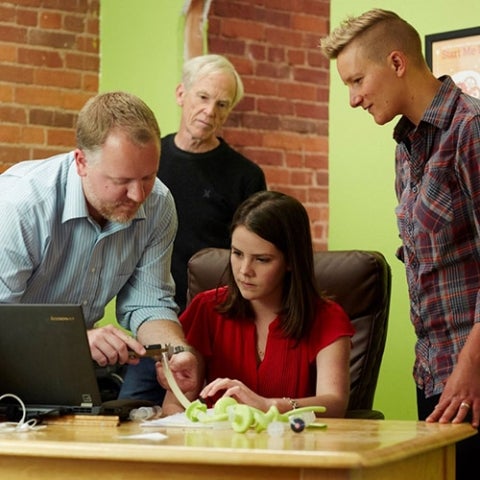
When Carlin and Norred graduated and moved on to engineering careers, Jessie stuck with the device they had created and co-founded Alydia Health with medical device engineer Nathan Bair.
Meanwhile, she and Ian began dating in 2014 and married in 2018.
“Jessie and I could commiserate on some things, like the difficulties of being a founder or a CEO,” Ian said, “It was interesting to talk about our challenges and compare notes, but our businesses were different enough that we had pretty different experiences as founders.”
After landing investors in 2015, Ian’s business merged with another two years later to form Syncro, an all-in-one professional services automation and remote monitoring and management platform for managed service providers.
As Syncro grew from seven employees to over 100, the big question for Alydia was: Would its device, designed to stop excessive bleeding, work?
“Our first patient was in Jakarta, Indonesia,” Jessie said. “We believed that it would work, but getting the news that it had stopped a woman’s hemorrhage in an emergency situation and worked faster than we expected it to was pretty incredible.”
While 2020 was marked by the devastating impact of a global pandemic, it was a whirlwind year for the power couple: In August, Syncro received a substantial equity investment from venture capitalists Mainsail Partners, potentially setting the company up for a major sale. That same month, Alydia received crucial clearance from the FDA, and seven months later, in March 2021, women’s healthcare company Organon announced that it was acquiring Alydia for $240 million. When the acquisition was completed in June, it marked the most ever paid for a business that emerged from Cal Poly’s CIE.
“I still don’t quite believe how fortunate we’ve been with our businesses,” Jessie said.
Both Jessie and Ian say it wouldn’t have happened without support from Cal Poly and the CIE.
Thirteen years after the CIE’s launch, alumni like this couple are starting to give back, Karpin said.
When he was participating in the Innovation Quest as a student, supporters told Ian they hoped he too would one day pay it forward.
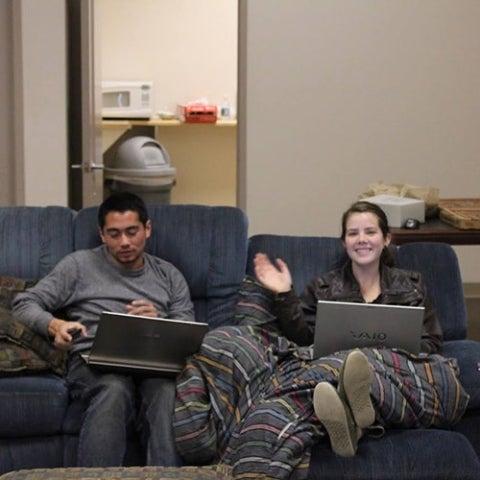
“I felt a little bit of a responsibility to do that because so many people helped me to be successful, and I wanted to honor that and fulfill that obligation,” said Ian, who, along with Jessie, recently helped Katona with the latest Innovation Quest.
Many donors, Karpin said, want to help students have a positive impact on the world while in school – and many students are driven by altruistic goals.
“This generation of students is pretty hard wired to do good work,” he said.
The Alydia Health device that two Cal Poly engineering students created in 2011 is now saving lives around the world and can be found in U.S. hospitals everywhere.
Jessie, who is an entrepreneur in residence at Sacramento State and program director of FourthWave, an accelerator for women-led tech businesses, wants to continue to make a difference.
“The whole reason I co-created InPress was to create positive change in the world,” she said. “And that has not changed.”
Neill, who remembers Jessie’s quiet determination in his class, noted how she leveraged Cal Poly’s Learn by Doing approach and the CIE’s expertise to make a difference.
“The impact is amazing, and it really exemplifies what we’re about,” he said. “And I keep thinking of the other Jessies that are out there.”

